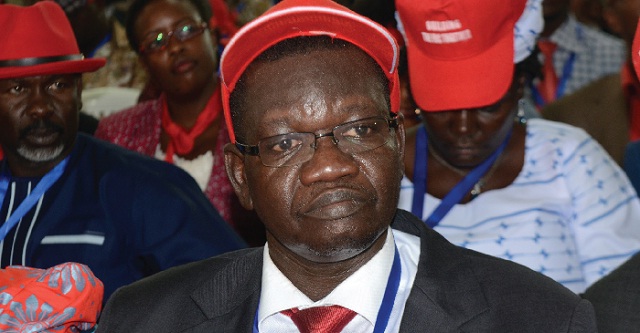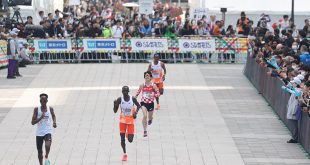
Will new president Amuriat lead FDC forward or backwards to Besigye?
Kampala, Uganda | IAN KATUSIIME | With the election of Engineer Patrick Oboi Amuriat as president of Uganda’s biggest opposition party, the Forum for Democratic Change (FDC) behind him, Grant Senabulya, a delegate from Nakaseke district who looks to be in his 70s is looking ahead, not back. He told The Independent that he is now concerned about the direction the party takes at national level.
“Right now we have two groups: defiance and compliance. I want us to hold power without shedding blood,” he said.
Ssenabulya, who is the FDC secretary general of Nakaseke District, says he voted Muntu in 2012 but does not say how he voted in 2017.
“All I want is a party that advocates for peaceful change,” he says.
There are many in FDC who, like Ssenabulya, are anxious about how Amuriat will lead the party.
As party president, the defeated Gen. Mugisha Muntu struggled to unite FDC and at the Delegates’ Conference at Namboole Stadium in Kampala where the vote was held on Nov.24, the defiance and compliance camps were on show.
Seeing the schisms, however, the party’s national chairman Wasswa Birigwa said it is a mistake to think FDC is a burning house.
“My house is FDC,” he said, “I accept their diversity, they are different but they are the same.”
But supporters of Amuriat said they were disaffected with Muntu and his philosophy of so-called “organisation” which stressed building “organisational capabilities” for the party as a way of transcending individualism and building grassroots structures across the country.
And when the final results trickled in with Amuriat bagging 641 votes (57%), it was clear Muntu’s much vaunted mantra of organisation had been rejected, getting only 463 votes (41%). What is unclear is how Amuriat will lead.
During the campaign, he pledged to “reclaim our victory”. He was a central member of the so-called ‘People’s Government’, an FDC faction that treats the party’s flag-bearer in the 2016 presidential elections, Col. (retired) Kizza Besigye, as the rightful winner and, therefore rightful president of Uganda.
This group has been operating mainly from an office located on Katonga Road in Kampala where Besigye has an office. Here, they have constituted a full-fledged government in which Amuriat is the Minister for Local Government.
In his manifesto, Amuriat, pledged to have the faction occupy “its rightful space in Najjanakumbi”, the official headquarters of the party. He has also pledged to restore more powers to Besigye in what is being seen as dragging the party to its past and not the future.
During the campaign, Amuriat pledged that as soon as he was elected “the debate over which approach the party needs to use to overthrow the dictatorship will end”.
If he follows through on the pledge, FDC might encourage more acts of defiance and denial of cooperation in parliament where it detests being labeled “the opposition”. There might also be a return to an endless regime of street protests as was seen after the 2011 elections. Sources in the party say Amuriat could make changes in the party cabinet soon starting with the Leader of Opposition and Chief Whip in Parliament; positions occupied by Winnie Kizza and Ibrahim Semujju Nganda respectively-key Muntu appointees.
Some supporters like Abdullah Ebokorait, the FDC chairperson for Kumi district are excited that the ‘defiance’ ideology of Besigye will now be in full mode. Various FDC members say Amuriat cannot be his own man simply because he won due to a coalition of networks patronised by Besigye and Nandala Mafabi.
Besigye’s proxy
Therefore, as Amuriat starts a new chapter of his political career, the figure of Besgye looms large over him. In his final pitch to delegates, Muntu told Amuriat that he should first understand the source of the internal conflicts in the party before he can go about managing them.
Many saw it as a rebuke to Besigye and his acolytes who petitioned the party’s electoral commission team after Muntu defeated Mafabi in 2012. Shortly after, the party wrangled for two years over internal process. Muntu left no doubt when he told Amuriat that his backers were those behind the wrangling then.
Throughout his campaign, Amuriat was criticised as simply re-echoing Besigye’s talking points. Now that he is FDC president, supporters of Muntu are concerned.
“If you think Amuriat is standing on his own, then you can as well think (Raphael) Magyezi is the one who wants Article 102 (b) amended,” Nabila Naggayi, Kampala Woman MP told The Independent before the election. Naggayi, a supporter of Muntu said she is drawn to the former party president because of his selflessness. “He does not take opposition to him as a crime, he takes it in stride” she said.
Naggayi has been a fierce critic of Besigye and accuses the former presidential candidate of selfishness. “He is just shy of amending the article to run for FDC president again,” she adds, “Muntu’s brand says we are smaller than the party.”
Naggayi argued that Muntu wanted FDC institutions to grow and hints that government agencies are not empowered because of similar failure to let institutions rise above personalities. “This is the same thing that has been happening in the party. If my support for Muntu is the reason I am branded as a mole, so be it”.
In reality, one could argue that FDC is having its Donald Trump or Brexit moment- two events that rocked Western democracies in 2016.
Amuriat fondly referred to as POA, was derogatively called a “villager” when he joined the race for party president months ago. And just like the possibility appeared remote of Trump being elected president of the U.S. or Britain voting to leave the European Union, Amuriat was considered a long shot for the position he was gunning for.
 The Independent Uganda: You get the Truth we Pay the Price
The Independent Uganda: You get the Truth we Pay the Price


